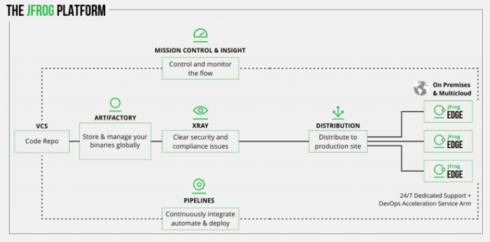
JFrog has announced the “JFrog Platform,” a new hybrid and multi-cloud universal DevOps Platform designed to deliver DevSecOps, CI/CD and software distribution solutions in an all-in-one experience.
“Developers consistently tell us that for DevOps to be successful, they require several key elements: best-of-breed package management, advanced CI/CD solutions that span and control the pipeline all the way through distribution and security baked in for a unified DevSecOps experience,” said Yoav Landman, CTO and co-founder of JFrog. “At the same time, as many shops look to automate everything that happens between Git and Kubernetes, they must maintain tool quality and easily integrate existing technology choices through open APIs. We’re proud to deliver the JFrog Platform to address these end-to-end automation requirements.”
RELATED CONTENT:
Creating a DevOps culture
A sober view of DevOps and the value it can create
5 steps to master continuous delivery
The JFrog Platform release includes support for all major package types with JFrog Artifactory; automation through REST APIs and CLI across the platform; advanced speed and efficiency with universal navigation, UX and metadata models across all of the products; unified administration; pipeline automaton; and JFrog services natively integrated across the JFrog Platform.
In addition, the new release comes with the inclusion and full integration of JFrog Pipelines, the company’s centralized, cloud-native DevOps pipeline automation and orchestration solution. Pipelines blends Shipple’s CI/CD tool into the company’s platform. JFrog acquired Shippable in February of last year.
“Digital transformation in the enterprise is driven by software, and software is being indisputably transformed by DevOps,” said Shlomi Ben Haim, CEO and co-founder of JFrog. “As global enterprises adopt cloud native practices to increase speed, security and automation, they demand DevOps solutions that allow them to avoid vendor lock-in – both in technology and infrastructure choices. We’re honored to respect and reflect these requirements with universal, hybrid, multi-cloud solutions.”
More details are available here.






